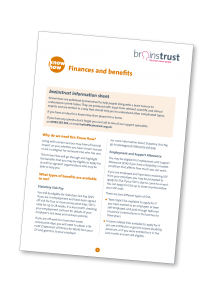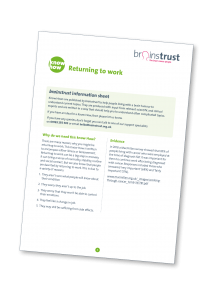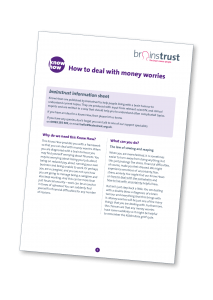Practical information to help you move forward
Living with a meningioma means that different aspects of your life will sometimes change. Medical needs aside, we know that often it is the practical aspects of life, such as driving and finances, that can have the biggest impact on your quality of life. For example, losing your driving licence is life-changing, as it brings with it a loss of independence and may impact your ability to work. On this page, you will find practical meningioma patient information to help you move forward with your life and find calm in the chaos.
Driving
Driving is a topic that is frequently spoken about among our community. When you are diagnosed with a brain tumour of any type, and you hold a valid driving licence, you must inform the DVLA of this. Once you let them know, they will then assess whether you have to surrender your driving licence. This decision is based on many different things, including the tumour type and your treatment pathway.
Our ‘Driving’ Know How goes into more detail about the process of contacting the DVLA and how long you may have to surrender your licence for.

We know that the prospect of having to surrender your driving licence is a big challenge. It can mean a loss of independence, and the uncertainty of when you may be able to resume driving can cause feelings of anxiety. Below, you will find some information on some alternative travel options while you are not able to drive.
Travel assistance
If you are struggling with symptoms caused by a meningioma, you may be entitled to help with some aspects of travel and getting around. In some cases, this may help to make day-to-day living a little easier.
While a meningioma diagnosis doesn’t give you an automatic entitlement to any of the schemes outlined here, it is always worth looking into your eligibility according to your symptom burden. Most of the items listed below require you to prove eligibility for certain disability benefits.
National Rail offers a Disabled Person’s Railcard scheme, where you and one person accompanying you can get a third off rail fares. This costs £20 and is available here: https://www.disabledpersons-railcard.co.uk/
You can link your Disabled Person’s Railcard to your Oyster card to get a third off Oyster pay-as-you-go single fares and daily caps on National Rail, London Underground and Docklands Light Railway services. Register at any London Underground, Overground or National Rail station ticket office that issues Oyster cards.
If you live in a London borough, you can apply for a Disabled Person’s Freedom Pass to gain free travel across London and free bus journeys nationally. Some boroughs offer passes at their discretion to people who do not meet the eligibility criteria.
Contact your local county council to apply for a free bus pass.
what3words is a free app that helps you to easily and accurately identify your location to the emergency services. This could potentially be very useful if you have seizures and going out alone is a worry for you. Search ‘what3words’ in your phone’s app store.
Displaying a Blue Badge allows you to park in disabled parking bays, often meaning that you can park closer to your destination.
You may be eligible for a Blue Badge if you cannot walk or have difficulty walking, and can evidence this in your application.
Additionally, the criteria have recently been expanded so that people with ‘invisible’ disabilities are now potentially eligible for the scheme. This means that in addition to physical disabilities, non-physical disabilities, including cognitive impairment, psychological effects, such as feeling overwhelmed by busy or loud environments, and cognitive fatigue, are now taken into account.
Check your eligibility and apply here https://www.gov.uk/apply-blue-badge (England, Wales & Scotland) or here https://www.nidirect.gov.uk/information-and-services/motoring-and-transport/blue-badge-scheme (Northern Ireland).
If treatment can give you an unpredictable stomach, or if you suffer from sickness, it can make the thought of going out anywhere new really challenging. A RADAR key offers you access to the 10,000 locked disabled toilets in the UK, making going out in public far less worrying.
More information about the RADAR National Key Scheme and accessible toilets is available here: https://www.which.co.uk/later-life-care/home-care/out-and-about/radar-keys-and-locked-toilets-apsxd1p6br8k?gclid=CjwKCAiAwrf-BRA9EiwAUWwKXoro-oWYtTw0O8IDbvFYqsWt973kql_cj5v-YWXtjf7HRSAIkYPsQhoC4EEQAvD_BwE
Support around finances and returning to work
Following your diagnosis, circumstances may change, and you might find yourself in a situation where your finances are impacted and you are having to look at what financial support is available to you.
If you would like to speak to someone about benefits that you may be eligible to apply for, then we can connect you with our Welfare and Benefits Advisor volunteer. Send us an email on hello@brainstrust.org.uk or call us on 01983 292 405 to find out more.
Our ‘Finances and benefits’ Know How guides you through the different types of benefits that may be available to people living with a brain tumour diagnosis. It also signposts where you can go to for support.

Returning to work following treatment for a meningioma can be a big change. You may be returning to the same job that you were doing before your diagnosis, or you could find that you are looking for a change. Either way, we know this can feel like a daunting task, and one that you may find you need support with.
Our ‘Returning to work’ Know How will guide you through some strategies to help you prepare for returning to work. It will also advise you on support and help that may be available to you.

When dealing with financial challenges, it can be helpful to have some strategies available to you to help you take a step back and feel able to deal with them.
Our ‘How to deal with money worries’ Know How is designed to provide you with some strategies and tips to help you look at financial challenges differently and work through them.

Coaching

All the information on this page has been written to help you feel supported and more in control when living with a meningioma diagnosis. On top of this, we understand the importance of having someone to talk to and, sometimes, having an extra intervention when the challenges of living with a brain tumour diagnosis become too much.
Coaching
When life feels all-consumed by your brain tumour, coaching helps you to take control and focus on the things that matter the most. You will come away from your coaching sessions with strategies and tools to help you achieve clarity and improve your quality of life.







